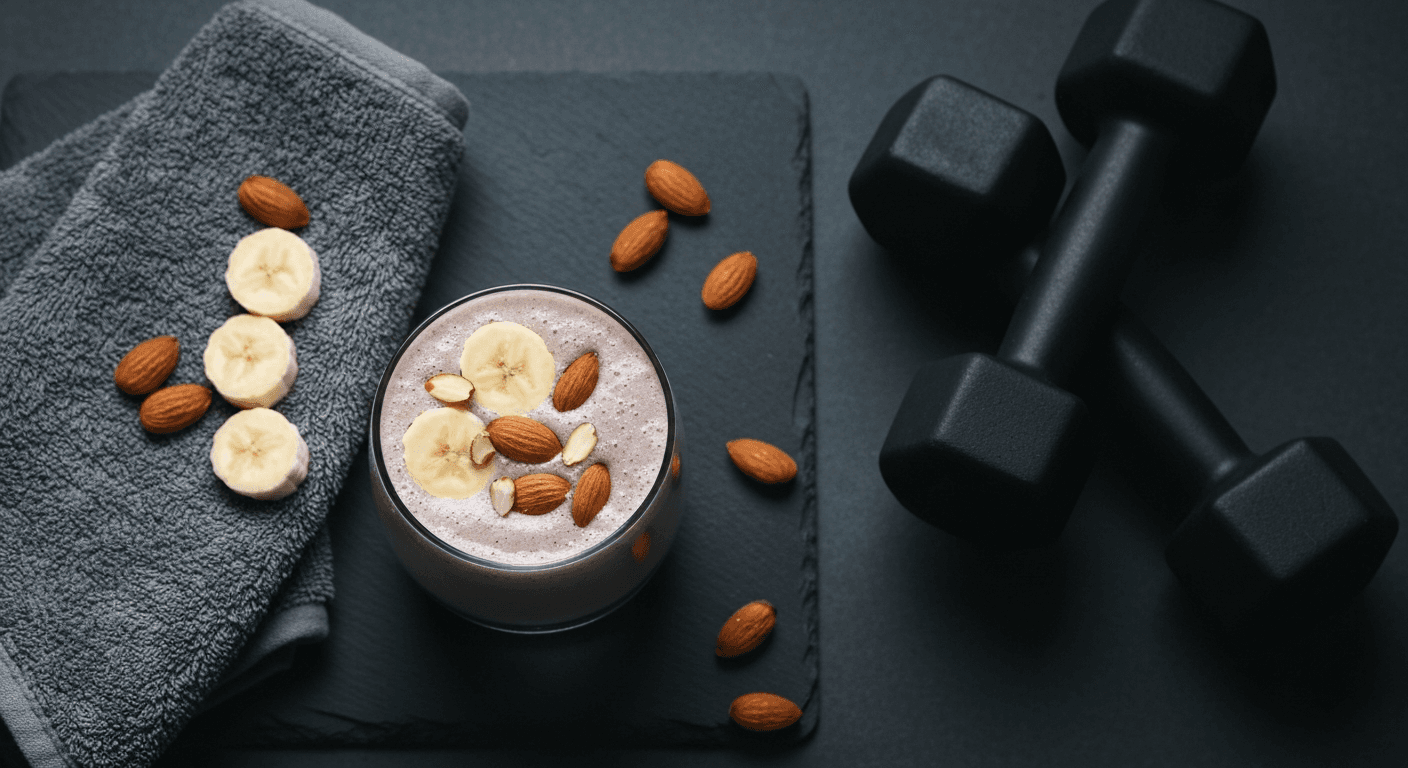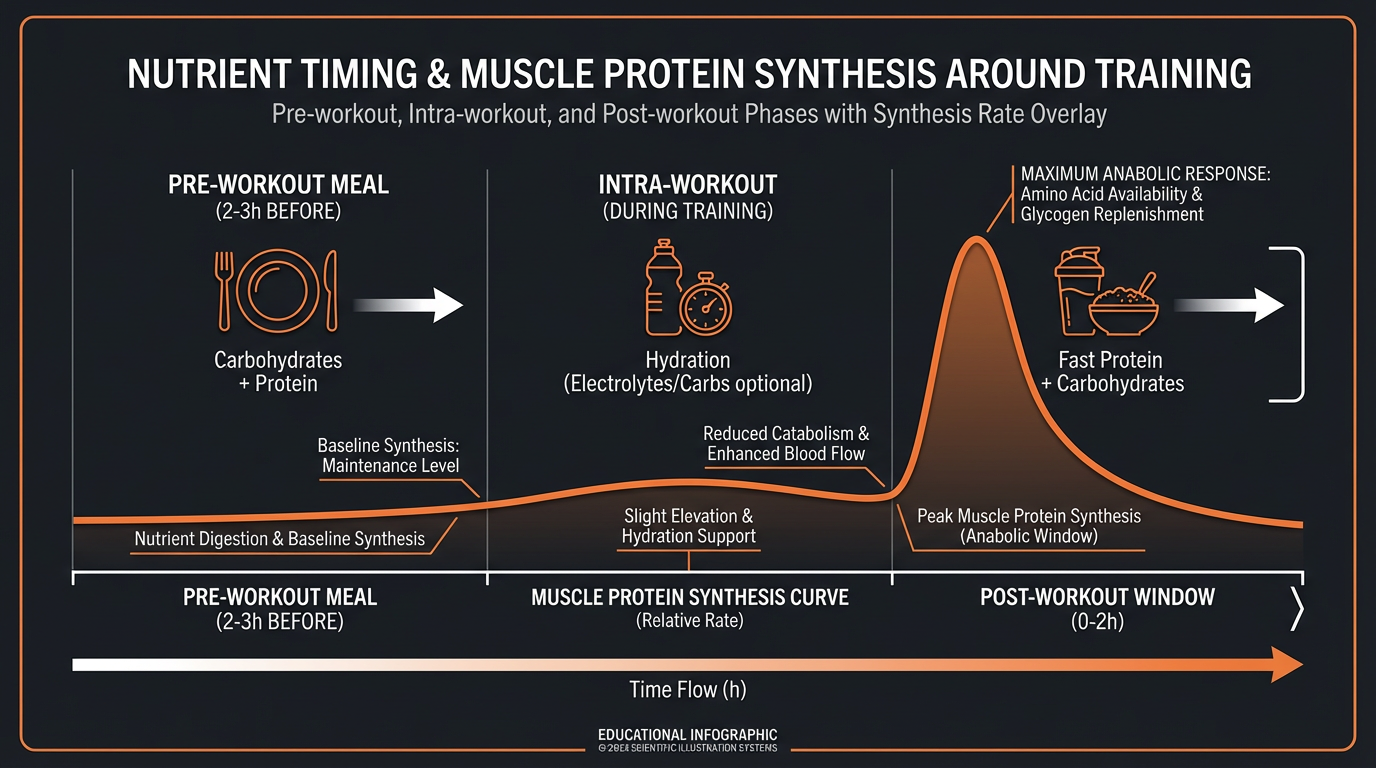Nutrient Timing for Muscle Growth: Optimizing Pre and Post-Workout Meals
Read our comprehensive guide on nutrient timing for muscle growth: optimizing pre and post-workout meals.

Key Takeaways
- Eat carbs, protein, and healthy fats 2-3 hours before your workout to fuel maximum performance.
- Hit 20-40 grams of protein plus carbs within 30-60 minutes after training to kickstart muscle repair and refill glycogen stores.
- If you're training early morning and can't eat a full meal, grab a banana with almonds and a protein shake.
- Plan and prep your pre and post-workout meals ahead of time so you're never scrambling for the right fuel.
- Pay attention to how your body responds to different foods and timing, then adjust your approach based on what works best for you.
Get a Free AI Coach on WhatsApp
Ask questions, get workout plans, and track your progress — all from WhatsApp.
Message Your CoachWhen it comes to muscle growth, many people focus solely on their workout routines, overlooking the importance of nutrient timing. Optimizing pre and post-workout meals can significantly impact muscle recovery and growth. Let's delve into the science and strategies behind nutrient timing to maximize your results in the gym.
Understanding Nutrient Timing
Nutrient timing involves consuming the right nutrients at specific times to enhance performance, recovery, and ultimately, muscle growth. It’s not just about what you eat, but also when you eat it. Research shows that strategically timed meals can improve muscle protein synthesis, enhance glycogen storage, and reduce muscle damage (Source: National Institutes of Health).
Here, we'll break down the essential components of nutrient timing, emphasizing the importance of both pre and post-workout nutrition.

Pre-Workout Nutrition: Fueling Your Body for Maximum Performance
Eating before a workout is crucial as it provides the energy and nutrients your body needs to perform at its best. The goal is to consume a balanced meal that includes carbohydrates, protein, and fats about 2-3 hours before exercising.
- •Carbohydrates: Carbs are the primary fuel source for your muscles during high-intensity workouts.
- •Protein: Consuming protein before exercising supplies your muscles with amino acids, promoting muscle synthesis.
- •Fats: Healthy fats sustain your energy levels throughout the workout.
A well-rounded pre-workout meal might include a chicken sandwich on whole grain bread with a side of fruit. For those who are pressed for time, a smoothie made with oatmeal, banana, and protein powder can be an effective option.
Post-Workout Nutrition: Recovering and Building Muscle
Post-workout meals are equally important as they help to replenish glycogen stores, repair muscle tissues, and promote muscle growth. The key is to consume a combination of protein and carbohydrates within 30-60 minutes after finishing your workout.
- •Protein: Aim for 20-40 grams of high-quality protein to kickstart muscle repair.
- •Carbohydrates: Consuming carbs helps replenish the muscle glycogen that was depleted during exercise.
- •Hydration: Don't forget to rehydrate with water or an electrolyte drink.
Examples of effective post-workout meals include a shake made with whey protein and a banana or a grilled chicken breast with quinoa and vegetables.
Common Questions and Concerns About Nutrient Timing
Many people wonder if nutrient timing is truly necessary or if it's a myth. While the concept might not be essential for everyone, it can be particularly beneficial for those engaged in intense training or looking to gain muscle mass efficiently.
Another common concern is what should be eaten if working out early in the morning. In such cases, a small snack like a banana or a handful of almonds with a protein shake can suffice to provide the necessary fuel.
Practical Tips for Effective Nutrient Timing
Here are some practical, actionable tips to help you master nutrient timing:
- •Plan Ahead: Prepare your meals in advance to ensure you have the right foods available when you need them.
- •Stay Consistent: Develop a routine that fits your schedule and stick to it.
- •Listen to Your Body: Pay attention to how your body responds to different foods and timing, and adjust accordingly.
Incorporating these tips into your daily regimen can make nutrient timing feel more manageable and less daunting.
Conclusion: Take Action for Optimal Muscle Growth
To sum up, nutrient timing plays a critical role in muscle growth and recovery. By optimizing your pre and post-workout meals, you can make significant strides in your fitness journey. Remember to consume a balanced mix of carbohydrates, protein, and fats before working out and to prioritize protein and carbohydrates immediately following your training session.
Ready to put these strategies into action? Start by planning your meals for the week and noting how your body responds. Your muscles will thank you!
Frequently Asked Questions
- What should I eat before lifting for muscle growth?
- A balanced meal with 30-40g protein and 40-80g carbs about 2 hours before training. Carbs fuel the session, protein provides amino acids. Something like rice with chicken, or oatmeal with whey protein. Keep fat moderate to avoid feeling sluggish.
- How soon after lifting should I eat?
- Within 2 hours is a reasonable guideline. If you ate a full meal 2-3 hours before training, the urgency is lower since those nutrients are still being digested. If you trained fasted or it's been 4+ hours since your last meal, eat sooner rather than later.
- Are fast-digesting carbs necessary after a workout?
- Not really. The old "slam dextrose post-workout" advice assumed you needed to spike insulin ASAP. Research shows that any carb source, fast or slow, works fine when paired with protein after training. White rice is just as effective as a sugar drink.
- Does eating more meals per day build more muscle?
- Distributing protein across 4-5 meals of 25-40g each slightly outperforms cramming it all into 1-2 meals for muscle protein synthesis. But we're talking about small differences. Three solid meals with a couple protein snacks is a practical sweet spot.